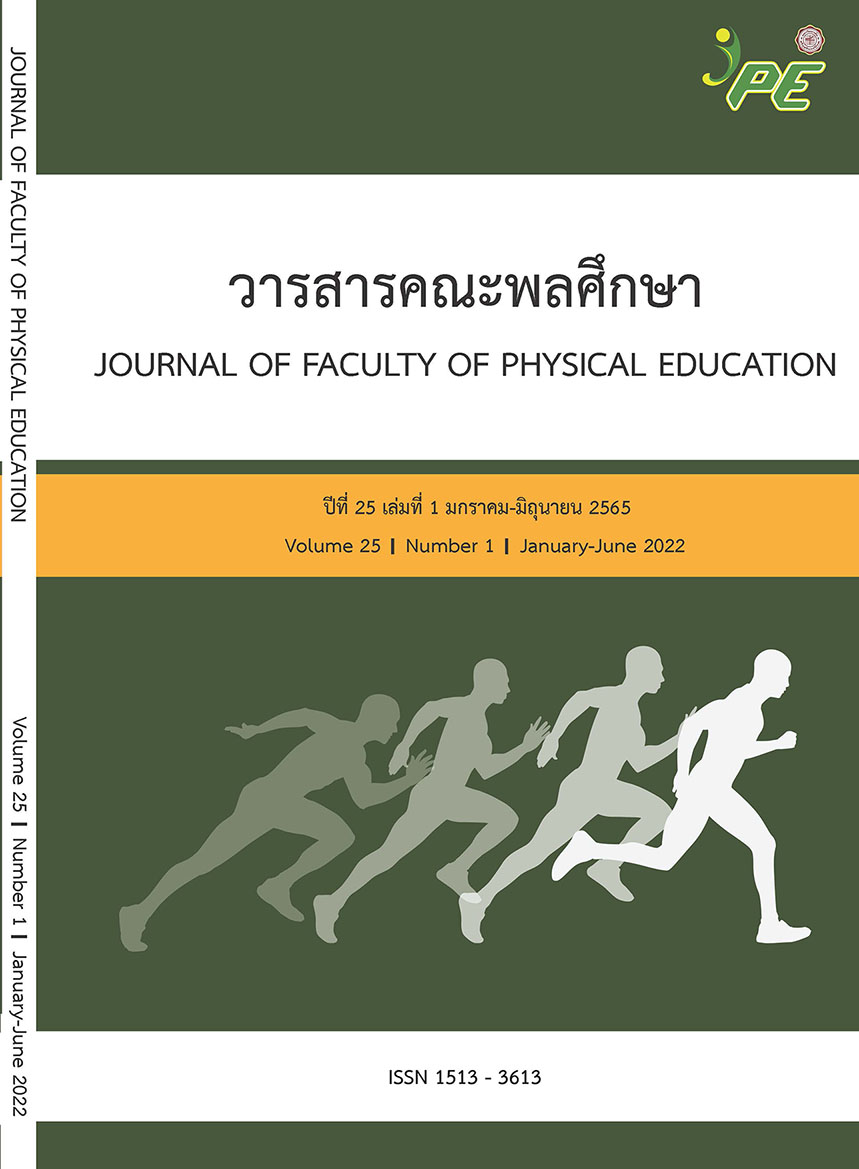The Recreation Activity of Develops Executive Functions on Early Childhood
Main Article Content
Abstract
Executive functions are a process of thinking that consists of working memory, inhibitory control, cognitive flexibility, attention, emotional control, self-monitoring, initiating, planning, organizing, and goal directed persistence. This is an important skill that should be instilled in children from early childhood to develop and learn appropriately through co-teaching and practice through experiences of participating in various recreational activities. To develop executive functions for early childhood as well as improve the quality of life and including enhancing physical, mental, emotional, social, and intellectual skills. Recreation is a voluntary creative activity that is done in free time to have funs and enjoyment. It is an activity that creates value in using free time usefully and contributes to the development of executive functions for a successful life for early childhood in basic memory skills, concentration, planning, commitment, responsibility, self-control, and dealing with emotional well. Participation in a variety of recreational activities plays a role in developing skills for early childhood children. The benefits and values of participating in recreational activities are not only for early childhood but also for families and society still benefit. In terms of academic success, good education, positive behavior, being able to work with others, leadership, decision-making, healthy and future economic stability. Recreational activities are an important tool for developing executive functions for a successful life in early childhood. Organizing a variety of experiences through participation in activities practice and social interactions that allow early childhood to take action on their own. It creates experiences, values, positive behaviors, and decisions for themselves, families and society.
Article Details

This work is licensed under a Creative Commons Attribution-NonCommercial-NoDerivatives 4.0 International License.
Any articles and comments This journal is the opinion of the author. The Faculty of Physical Education doesn't always have to agree. Anyone wishing to publish or distribute a message must obtain direct permission from the author.
References
Chaipang, O. & Srisurak, C. (2021). The using of cooking activities to promote frontal brain skills for earlychildhood. Lampang Rajabhat University Journal, 10(1), 166-175.
Dawson, P. & Guare, R. (2010). Executive skills in children and adolescents: A practical guide to assessment and intervention. (2nd ed). Guilford Press.
Harnkajornsuk, S. (2021). Development of board games fro enhancing executive functions in youngchildren.
Harnmethee, S. (2015). EF : Life immunity and drug suppression. Rakluk Books.
Harnmethee, S. (2016). Executive Functions. RLG (Rakluke Learning Group).
Jaiwang, A., Leesattrupai, C., & Piasai, P. (2019). Effects of creative dance training on executive functions in preschool. Suthiparithat, 33(108), 186-197.
Journal of Humanities and Social Sciences, Rajapruk University, 7(Special), 191-202. Karnjanakij, S. (2021). Recreation & tourism industry. Bangkok: Chulalongkorn University Press; 2017. Kraus, R. (2001). Recreation and leisure in modern society. Jones & Bartlett.
Netrnilweerachot, D., Haenjohn, J., & Supwirapakorn, W. (2018). The effects of storytelling based on the royal guidance of King Rama IX program on executive functions of the brain in early childhood. Journal of Educational Measurement, Mahasarakham University, 24(2), 62-79.
Nopakhun, C. (2018). The development of executive function for 21st century preschool children through Montessori approach. Journal of Education Silpakorn University, 16(1), 75-90.
Nuansithong, N. (2017). Effects of storytelling on promotion of language learning ability among preschool children. Journal of Nursing and Health Care, 35(2), 140-147.
Nuanuan, R. (2015). Development problems in children skill aged 4-6 years confusing left-right directions by ballroom dance. Srinakarinwirot University.
Oboom, J. & Wongwitchayut, P. (2020). Experience management to promote self-regulation behavior of early childhood children through allegories. Journal of Legal Entity Management and Local Innovation, 6(2), 103-113.
Palittapongarnpim, P. (2018). How to raise a child to get EF. Praew, friends of Children, EPPO.
Phungching, S. (2019). The effect of art activities with natural materials of SSAPA+c model to improve self-regulatin and creative thinking of young children. Silpakorn University.
Roeksamut, P. (2019). Developing of music skills kindergarten's originality to creative thinking by kodaly approach based musical activity. Srinakharinwirot Research and Development. Journal of Humanities and Social Sciences, 11(21), 74-87.
Seemawong, S. & Samahito, C. (2019). The effect of cooking activity on preschool children creativity. Journal of Graduate School, Pitchayatat, 14(1), 175-184.
Stumbo, N. J. (1997). Leisure education III: More Goal-Oriented Activities. Venture.
Suvetwethin, D. (2017) Executive functions: Key of educational development. Thaihealth. Retrieve from https://www.thaihealth.or.th/Content/39735-'EF/'%20หัวใจสำคัญการพัฒนาการศึกษา.html
Winyagoon, P, Seree P & Thanasethakorn, P. (2021). The effect of learning experience based on the EF Guideline to executive function skills in preschoolers: a case study of the child central preventorium for children. Thialand Journal of Health Promotion and Environmental Health,
(2), 64-82.


